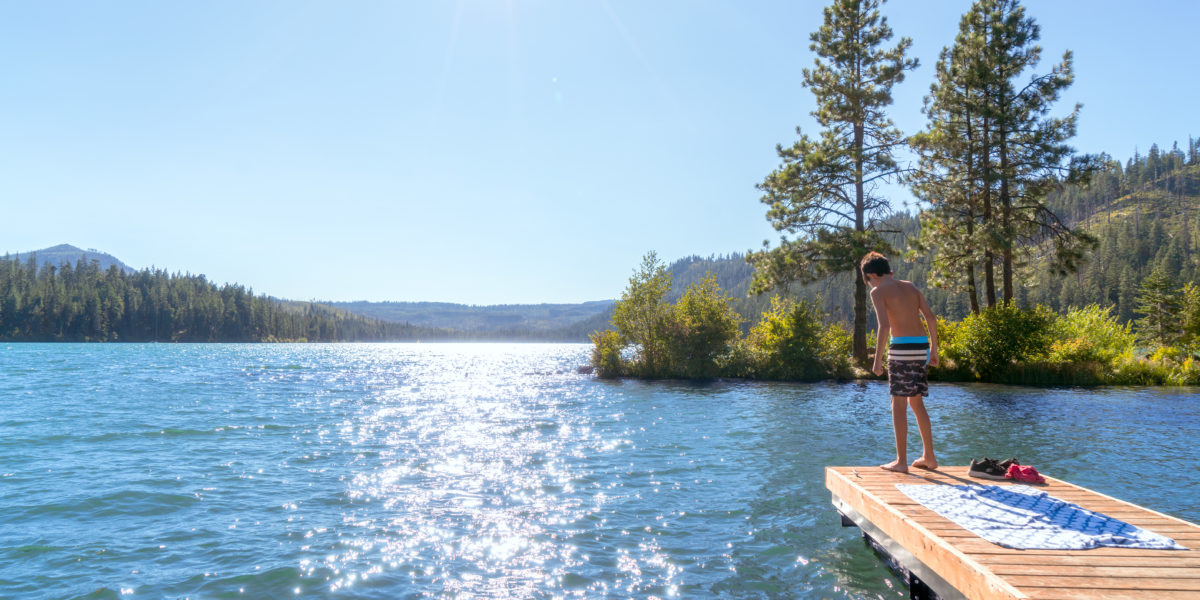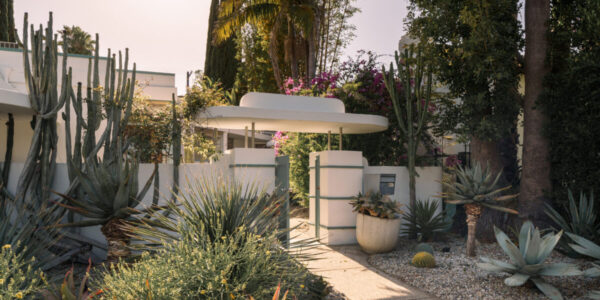
Lake Effect: On Reviving a Family Tradition with Your Closest Friends
Retreat to Oregon’s Suttle Lake to revive a childhood tradition with friends

Thomas J. Story
I grew up near a lake, out east, and most years, my family—part Canadian, part American—would rent a cabin on a body of water not far from the long border between the countries. Usually, the lake had a mix of pines and maples around it, mallards and mergansers on it, the sky’s changing moods reflected in it. On my first day staying on Suttle Lake in Oregon’s mountainous interior, I get nostalgic for my absent family.
Most days, my grandmother would do an hourlong swim in the frigid waters, always keeping her head well above the water so as not to ruin her hairdresser’s hard work. I see my mother on a low chair on some dock or other, wearing a colorful kerchief, working on her cryptic crossword, or beavering away at her summer-project book. Never good at sitting still, my Dad is paddling a green, cedar-strip canoe about, with our black Labrador for company—the dog curbing his natural enthusiasm just enough so as not to tip the canoe over.
There tended to be wild blueberries and mosquitoes in the mix, thwacking screen doors and cliff jumps, crying jags (the worst one brought on by bloodsuckers), and arms-raised euphoria (after winning a heroic game of Capture the Flag)—the amplitude, the exaggerated agony and ecstasy, of even the most fortunate childhood.
Now, as an adult, I’m carrying on my childhood summer tradition with friends. They are the people who have helped my partner and I adjust to the West in our decade out here, opening their homes, their circles, their lives to us. We are seven, all nature-loving city-dwellers, our day jobs—writers, teachers, techies, radio-producers—reflecting a certain slice of San Francisco Bay Area life.
We have planned a road trip to Suttle Lake, a sand-bottomed lake carved out of the Cascade Range by a glacier some 25,000 years ago. It was named for a wagon-train pioneer, John Settle, but a transcription error, somewhere along the line, became permanent, despite his descendants’ strenuous efforts to correct it.
I’d imagined that midway through the afternoon of the second day’s drive north from the Bay Area, we’d pull into Sisters, the congenial town nearest the lake and stock up at the local farmers’ market, grocery, and butchers. That we’d then go to the resort, settle into our cabin, and take a dip just as the sun was setting.

It was not to be. One of our cars broke down in Bend, about 150 miles over the Oregon border. While three of us accompanied the car to a dealership, the other four circulated in Sisters, texting their food and beverage finds. Sounds like we’ll have no lack of the in-season marionberries, both loose and in jams. We reached The Suttle Lodge & Boathouse after dark, and although our cabin’s kitchen was now well-stocked, all of us are road-weary and agree to grab a bite at the Boathouse, the lodge’s casual restaurant.
Since the 1920s, this lakeside site in the thick of the Deschutes National Forest has played host to multiple retreats—three burned down, one got damaged by a flood. In 2013, the team behind Portland’s hip Ace Hotel and new hospitality brand, Mighty Union, bought the down-on-its-luck place and refurbished it, giving it a scout camp feel right out of Wes Anderson’s Moonrise Kingdom.
The mirror in the bathroom has pine-branch surrounds; there are Pendleton throws on the beds and couches—roughing it, this isn’t. Inside the main lodge are carvings of bears and raccoons for banister finials, a bison head presiding from high up on the great room’s walls. The woman who checks us in has the latitude and longitude of the summer camp she went to as a girl tattooed on her forearm. But there are urbane Ace Hotel–type touches here too: in one corner, an old cabinet-ensconced hi-fi, with vinyl albums on the shelves above; in another, a wood-topped bar that offers a signature old-fashioned.
Rooms in the lodge are high-ceilinged, with views out over the lawn and the lake. There’s a rec room for rainy days equipped with a ping-pong table that reminds me of the epic games of table tennis I played with my cousins each summer.
In the Boathouse, the snack bar offers the same mix of the down-home and urbane. One of Portland’s top chefs, Joshua McFadden, consulted on the menu of lakeside classics (burgers, curly fries, soft-serve ice cream) and some sophisticated salads and sides. I indulge in a hot dog with all the trimmings, washing it down with a dry rosé, and hear my first loon call of the year coming off the now ink-black lake.

We are none of us in the first flush of youth, and, by this point, we all have our particular ways of doing things. The next morning, we realize we have, between the seven of us, four different methods of making coffee. Some of us decide to spend the day reading on lounge chairs in a gazebo overlooking the lake, others opt to do the 3.5-mile hike around the lake. I take after my Dad and unwind by paddling out on the lake, letting muscle memory execute the J-strokes needed to guide the canoe from the stern.
In the evening, after watching bats swoop about, picking off insects rising from an inlet off the lake, we assemble for the feast that’s supposed to be the weekend’s centerpiece. The Traeger grill on our porch struggles to reach the levels of heat we need, and all of us, pretty good entertainers and host+s in our own spaces, try to give each other enough leeway to do our respective things.
The resulting meal—par-grilled vegetables, mealy corn, steaks that are raw within—is just okay, so, sitting around the cabin’s round table, we largely ignore the food and instead trade wildlife sightings from the day past. I speak of the otters we saw—an adult otter helping to push sleek pups up onto a log, the better, it seemed, to watch the water-skiers cavorting around the lake. The friends who walked around the lake show photos of a pair of bald eagles they spotted. Something about the day on the lake—or perhaps the Oregon whiskey one of us sourced—looses old memories from my friends also, of camping trips past, of the first fish caught, and the brother who perfidiously threw it back in, before it could be paraded about.

We go for a fishing lesson the next day on a river, the Metolius, that draws some of its water from our lake. As well as giving us clear instructions on how to cast, our guide, Chris Martin, a longtime coach of local baseball and wrestling teams, shares his knowledge of the area, past and present, and its geology, in short, matter-of-fact sentences.
After a couple of hours without fish rising to our colorful, insect-mimicking bait, we give up, fishless, and get sandwiches from Camp Sherman Store and Fly Shop, a 101-year-old classic along the river. We eat on benches surrounded by tall Douglas firs and slender birch, with crested blue-black Steller’s Jays squawking from a tree above us, the river burbling away.
Thus cued, Martin says he remembers a woman in a floppy hat, from distant and exotic Los Angeles, coming to the step of that store, in the 1950s, looking around her and declaring it the most beautiful place she’d ever seen. “I hadn’t traveled much then, I was just a kid, but I have now, and I think she just might be right.” We all look around us differently, seeing it through his eyes—and hers.
